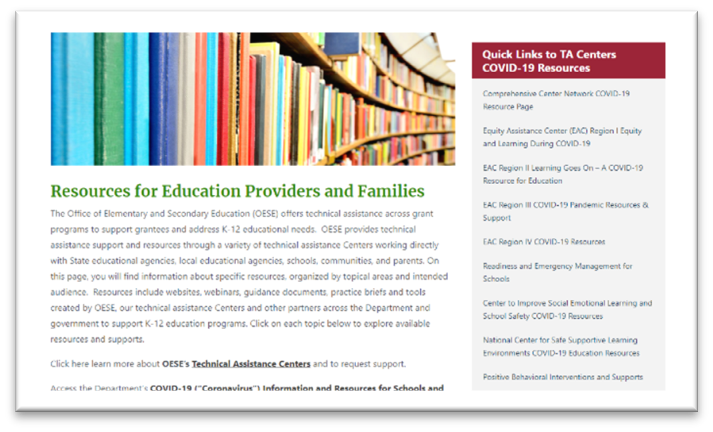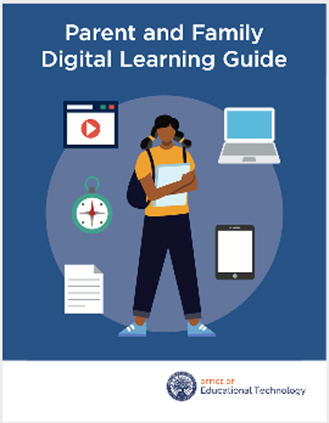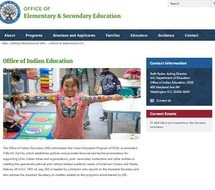
December 2020, Volume 2, Issue 3
Office of Elementary and Secondary Education (OESE)
Office of State Grant and Program Support Newsletter

From the Deputy Assistant Secretary
Letter From Ruth Ryder, Deputy Assistant Secretary for the Office of State Grant and Program Support

Dear Partners and Stakeholders:
As 2020 ends, I want to acknowledge the remarkable effort everyone in the education community has made in rising to the challenges we have faced this year. This year has been a testament to the resilience of our educators and students across the nation, as well as those who have supported the education field behind the scenes. I also want to acknowledge the great team here in OESE/OSGPS who, like many of you, seamlessly transitioned to remote work and ramped up support to their programs, while in many cases also supporting their children in their distance learning. Go Team!
Educators are working in a learning environment that is far from optimal, yet every day they rise to the challenge to make the most out of the situation for their students. It is this dedication, this display of courage and belief in what they do, that reminds me how important our educators are to our nation as they ensure the next generation will be prepared, no matter what challenges we face.
While educators have worked hard on the front lines, OSGPS has been working behind the scenes to support our grantees and other stakeholders by responding to questions, issuing fact sheets, identifying flexibilities, and administering the CARES Act programs. We have hosted multiple listening sessions with our grantees to understand the challenges facing your programs. We have developed a resource page on the OESE website as a central location for resources developed by our technical assistance centers. Finally, we continue to coordinate with several federal agencies including FEMA, CDC, and others in HHS to better serve our school communities. All of us, together, have worked harder than ever before under these difficult conditions. This has given us insight into the varying needs and challenges — but also the opportunities — to support the important work happening in our chosen field.
As we look toward 2021, my staff and I are committed to continuing our COVID-19 work to support grantees and stakeholders while striving to fulfill the mission of our organization.
I close 2020 by thanking all of you for your partnership with us, and I look forward to continuing that partnership in the new year.
All the best –
Ruth Ryder
|

Center on PBIS: Featured TA Center

Funded by OESE and the Office of Special Education Programs (OSEP), the Technical Assistance Center on Positive Behavioral Interventions & Supports (PBIS) assists schools, districts, and states in building systems capacity for implementing a multitiered approach to social, emotional, and behavior support. The broad purpose of the PBIS TA Center is to improve the effectiveness, efficiency, and equity of schools and other agencies. PBIS improves social, emotional, and academic outcomes for all students, including students with disabilities and students from underrepresented groups. The Center:
- provides key technical assistance to encourage large-scale implementation of PBIS;
- provides the organizational models, demonstrations, dissemination, and evaluation tools needed to implement PBIS with greater depth and fidelity across an extended array of contexts; and
- extends the lessons learned from PBIS implementation to the broader agenda of educational reform.
The PBIS TA Center may be contacted here.
|

Meet Department Staff Member Carlette KyserPegram
Learn more about Carlette KyserPegram, Education Program Specialist, Office of Safe and Supportive Schools, who works closely with the PBIS TA Center.
How long have you been at the Department?
I’ve been with the Department of Education for 21 years.
What did you do before coming to the Department?
I was a classroom teacher prior to coming to the Department.
What is your goal for the TA Center? Or what is one thing you’d like to see happen for this TA Center in the next year?
I really enjoy making meaningful connections and providing assistance to schools that are looking for ways to improve overall student achievement and outcomes. I would like to see the PBIS TA Center continue to provide relevant, timely, and innovative resources to meet the diverse needs of our grantees.
|

Meet Department Staff Member Renee Bradley
Learn more about Renee Bradley, Ph.D., Office of Special Education Programs, who works closely with PBIS.
How long have you been at the Department?
This past September marked my 23rd year at the Department, all in the Office of Special Education Programs.
What do you most enjoy about working at the Department?
I enjoy the intelligent, passionate, and innovative colleagues, both within OSEP and our stakeholders and grantees outside of the Department, that I get to work with every day to make schools and programs more positive and productive places for children and their families.
What is the one thing you’d like to see happen for this TA center in the next years?
It has been a privilege to work with this Center over the years and see it grow and impact so many students, parents, and teachers. I want to see the Center continue to be a respected resource for states, districts, schools, and families to assist them in their efforts to create and maintain positive, safe, supportive learning environments that enhance the ability of children with disabilities and their nondisabled peers to fully access, participate, and benefit from educational opportunities that prepare them for post-school successes. This will be even more important in the year to come as we are able to transition back to school.
|

Technical Assistance Resources - Featuring Return to School Success Stories and Resources

Returning to School Success Stories and Resources
The factors impacting how and when students return to school during a global pandemic can change by the day. This year, schools are experiencing multiple “returns” both at the beginning of the school year and periodically throughout the school year as educational instruction and delivery continue to change due to evolving circumstances.
In spite of the challenges, communities have persisted in ensuring students return to welcoming and safe schools this year. OESE has collected Back-to-School Success Stories, in which parents, students, teachers, school officials, and other community members share written accounts of their positive experiences returning to school.
Additionally, the OESE webpage Resources for Education Providers and Families features practical resources to support district leaders, school leaders, and educators for preparing to Return to School during and after significant disruptions. Explore additional topical pages to learn about resources for continuity of learning, learning at home, safe school environments, social emotional and behavioral support, and supporting special populations.
|


Return to School Collection
The Return to School Collection, curated by the National Comprehensive Center (National Center), includes resources designed to help state and local educational agencies, educators, and parents as they collectively navigate the unpredictable path back to school. Resources include a principal toolkit, a reopening guidebook, and return-to-school surveys to assess the socioemotional needs of the school community. The National Center has also gathered additional selected resources from national organizations and educational institutions to support and inform return-to-school decisions.
|

Response to Disruption Collection Blog and Video
The National Center released a blog post and video introducing the Response to Disruption resource collection. This collection features practical resources, including strategic budgeting tools, scenario planning resources, and communications planning and review guides designed to support school and district leaders in responding to educational disruptions and addressing the impact of COVID-19 on teaching and learning.
|

RESULTS Interstate Coordination Website
The Department has awarded a contract to RTI International to improve interstate and intrastate coordination of states operating Title I, Part C – Migrant Education Programs (MEPs). As part of this contract, RTI will host a website that includes resources for state and local MEP staff, such as self-guided presentations for onboarding new MEP directors, modules for training staff on the identification and recruitment of migratory children, and toolkits for carrying out program requirements. The new contract also includes options for communities of practice, the creation of an interstate exchange network for transferring and using student records for enrollment, placement, and credit accrual, and peer-to-peer activities to support new directors on MEP requirements. If you would like to learn more about the MEP and explore the resources available to everyone, please visit the RESULTS website.
|

Parent and Family Digital Learning Guide
The Department recently released a new Parent and Family Digital Learning Guide, a resource to help parents and guardians understand how digital tools can provide tailored learning opportunities, engage students with course materials, encourage creative expression, and enrich the educational experience.
|

Check in with Impact Aid

Impact Aid Information
Are you new to Impact Aid? Do you have questions about how to get started with the FY 2022 application? Visit our Impact Aid Application Portal at https://impactaid.ed.gov/ to sign up for our listserv and find updated resources to support your application. Start by viewing our announcements for the most recent news, including our upcoming webinar and application schedule. Help is always available by phone at (202) 260-3858 or email at Impact.Aid@ed.gov.
|

Grant Competition News

HEP and CAMP Discretionary Grant Competitions
In November, the Department’s Office of Migrant Education (OME) announced the FY 2021 applications for the High School Equivalency Program (HEP) and College Assistance Migrant Program (CAMP) discretionary grant competitions.
HEP and CAMP serve migratory or seasonal farmworkers, children of such workers, and members of their immediate family. Institutions of higher education (IHEs) or private nonprofit organizations may apply for a grant to operate a HEP or CAMP project. Each program expects to award approximately 14 five-year grants, estimated at $180,000-$475,000 annually.
HEP helps migratory and seasonal farmworkers (or children of such workers) who are 16 years of age or older and not currently enrolled in school to obtain the equivalent of a high school diploma and, subsequently, to gain employment or begin postsecondary education or training. The program serves approximately 5,000 students annually.
CAMP assists individuals enrolled in their first year of undergraduate studies at an IHE. The funding supports completion of the first year of studies. The program serves approximately 2,000 CAMP participants annually.
For grant information, visit the Department’s Forecast of Funding Opportunities for Discretionary Grant Programs page.
|

Office of Indian Education News
December updates on the Electronic Application System for Indian Education (EASIE) include:
- The Title VI Formula Grant EASIE Application Registration window will close on Dec. 11;
- The public comment period for the EASIE application changes closed on Dec. 7.
|
If you know someone who would like to subscribe to the SGPS Newsletter, encourage them to sign up HERE! This link also will allow subscribers to manage their subscriber settings and unsubscribe.
Archived newsletters are available here.
Sign up for more Department of Education-supported news resources,
This newsletter may reference and contain links to external sources. The opinions expressed in these sources do not reflect the views, positions, or policies of the U.S. Department of Education, nor should their inclusion be considered an endorsement of any private organization.
|







